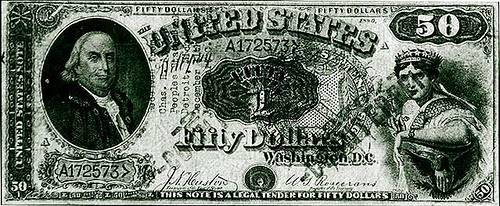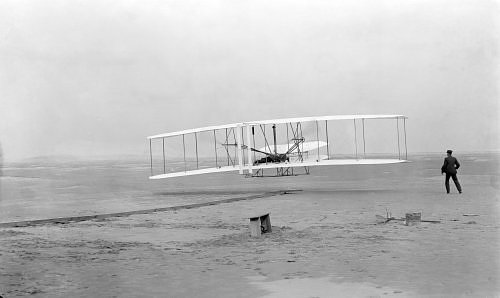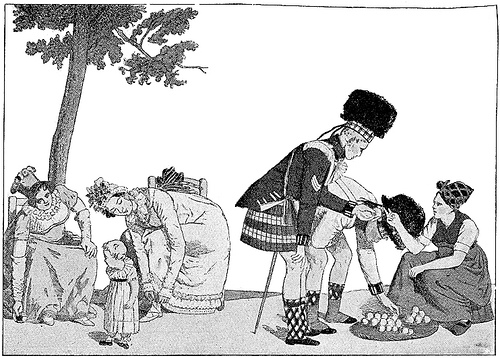407 = 43 + 03 + 73
In a Word
phobophobia
n. fear of phobias
Ninger Note

Counterfeiting was a lot harder in the old days.
In the 1880s, Emanuel Ninger, known as “Jim the Penman,” drew $50 and $100 bills by hand, spending weeks on each one. Fifty bucks was a lot back then, about $2,000 in today’s money, so the effort was worthwhile. This also meant that his “work” ended up in the hands of rich people, and he actually gained a perverse following who realized the forgeries’ value as works of art.
He drew this note in 1896, just before the Secret Service nabbed him. He’d left a note on a wet bar, and the bartender saw the ink run. Ninger served six months and was forced to pay restitution of $1. He never forged again.
Hot Stuff
8th [October, 1672]. I took leave of my Lady Sunderland, who was going to Paris to my Lord, now ambassador there. She made me stay dinner at Leicester-House, and afterwards sent for Richardson, the famous fire-eater. He devoured brimstone on glowing coals before us, chewing and swallowing them; he melted a beer-glass and eat it quite up; then, taking a live coal on his tongue, he put on it a raw oyster, the coal was blown on with bellows till it flamed and sparkled in his mouth, and so remained till the oyster gaped and was quite boiled. Then, he melted pitch and wax with sulphur, which he drank down, as it flamed; I saw it flaming in his mouth, a good while; he also took up a thick piece of iron, such as laundresses use to put in their smoothing boxes, when it was fiery hot, held it between his teeth, then in his hand, and threw it about like a stone; but this I observed, he cared not to hold very long; then, he stood on a small pot; and, bending his body, took a glowing iron with his mouth from between his feet, without touching the pot, or ground, with his hands; with divers other prodigious feats.
— Diary and Correspondence of John Evelyn, 1862
Progress

At 120 feet, the Wright Brothers’ first flight would fit inside a modern Boeing 747.
In the economy section.
A Little Culture
In 1959, Ed Zern reviewed Lady Chatterley’s Lover for Field & Stream:
This fictional account of the day-by-day life of the English gamekeeper is still of considerable interest to outdoor-minded readers, as it contains many passages on pheasant-raising, the apprehending of poachers, ways to control vermin, and other chores and duties of the professional gamekeeper. Unfortunately one is obliged to wade through many pages of extraneous material in order to discover and savour these sidelights on the management of a Midlands shooting estate, and in this reviewer’s opinion this book cannot take the place of J.R. Miller’s Practical Gamekeeping.
He wasn’t serious. On another occasion, a reader complained that his wife wanted him to give up outdoor sports: “If this keeps on I’m going to blow my brains out. Please give me whatever advice you can.” Zern responded: “Since trajectory isn’t important here, our recommendation would be a .35 Remington with 200-grain soft-nose bullet.”
Fire Escape
You’re new to hell, and you’re given a choice: You can go directly to the fourth circle, or you can play simultaneous chess games against Alexander Alekhine and Aron Nimzowitsch. Alekhine always plays black and smokes a pipe of brimstone. Nimzowitsch plays white and wears cufflinks made of human teeth. Neither has ever lost.
If you can manage even a draw against either player, you’ll be set free. But if they both beat you, you’ll go to the eighth circle for eternity.
What should you do?
Math Made Easy
142857 is a cyclic number — you can find its multiples simply by rotating its digits:
- 142857 × 1 = 142857
- 142857 × 2 = 285714
- 142857 × 3 = 428571
- 142857 × 4 = 571428
- 142857 × 5 = 714285
- 142857 × 6 = 857142
Also: 1428572 = 20408122499, and 20408 + 122449 = 142857.
A Sidelong Glance

“Kilt Curiosity,” caricature, continental Europe, circa 1815.
Spike Milligan was wearing traditional Scottish garb when a curious onlooker asked, “So, is there anything worn under the kilt?”
“No,” he answered, “it’s all in perfect working order.”
“The Salamander”
Make of this what you will — it’s a certificate signed in the 1750s by 11 witnesses, including two representatives of the Sorbonne and a counselor to the French parliament:
We, the undersigned, … certify that we have this day, between the hours of eight and ten o’clock in the evening, seen Marie Sonet while in convulsion, her head on one stool and her feet on another, the said stools being entirely within a large fire-place and under the mantel-piece, so that her body was in the air above the fire, which burned with extreme violence, remaining in that position for thirty-six minutes in four different times, (nine minutes each time) without the cloth in which she was wrapped (she was without other clothes) being burned, although the flames sometimes extended above her—the which appears to us to be quite supernatural.
And: “Again, we certify that while we were signing the present certificate, the said Sonet placed herself over the fire in the manner previously described, and remained there nine minutes, appearing to sleep above the brazier, which was very hot, having been replenished with fifteen large logs, and a faggot of kindling wood, during the last two hours and a quarter.”
(Cited in William Hammond, On Certain Conditions of Nervous Derangement, 1881.)
